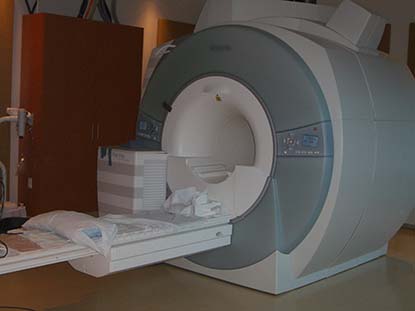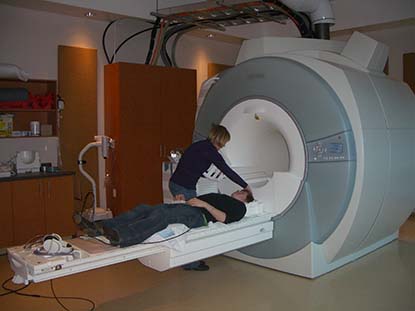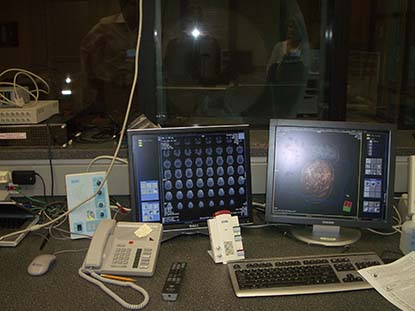What is fMRI?
fMRI, or magnetic resonance imaging, is a way to take pictures inside the body using a large magnet, radio waves, and a computer. fMRI, or functional MRI, uses the principles of MRI to look at how the brain functions. It is a method for investigating which parts of the brain are used for different cognitive tasks.
The Food & Drug Administration (USA) has indicated that MRI exposure at the level used in this project represents an “insignificant” risk. Canadian guidelines follow the USA guidelines. We will provide you with more information about any safety concerns before you decide whether to enroll in the study.
The following website can give you a more detailed explanation of fMRI: http://en.wikipedia.org/wiki/Functional_magnetic_resonance_imaging
What is the scanning session like?
The fMRI scanner is located at the Robarts Research Institute on the campus of the University of Western Ontario. Because the MRI scanner is a strong magnet, it can pull metal objects toward it. Therefore, it is important that you do not have any metal in or on your body. Every person who goes into the room with the scanner will be asked to fill out a form asking about any metal present in their body. Before approaching the scanner, you will be asked to take off your shoes and remove everything from your pockets and all metal items you may be wearing (for example, watches, jewelry, belts).

Robarts Research Institute
When you are ready, we will go into the scanning room. Parents may accompany their child into the scanning area while we are setting up.

The fMRI scanner
You will lie on your back on the scanning bed. Foam padding will be used to keep your head still. We will give you blankets and pillows to make you feel comfortable. Because the MRI is very sensitive to movement, it is important that you keep still once we start the experiment.

A participant getting ready for a scanning session
Once you are comfortable, we will place a coil over your head. We will attach a mirror to the coil so that you can see the screen behind you. The bed slides back into the tunnel-shaped magnet.

The control room
When the scanner is turned on, it makes loud humming and knocking sounds. You can hear a sample of the sounds the scanner makes here. Headphones and/or earplugs are used to block out this noise.
During some scans, you will be looking at and/or hearing stimuli and making responses using the response pad in your hand. During other scans, you can relax and watch a movie or close your eyes. Usually the experiments take about 30-60 minutes. After you come out of the scanner, we can tell you what the experiment was about and show you pictures of your brain.
How should you prepare for a scanning session?
For your comfort and safety, participants in fMRI studies should follow these guidelines:
-Do not wear shirts with metal around the head (e.g., pullovers with zippers). Metal buttons and zippers on pants are okay. When possible, sweatpants and sweatshirts are best.
-Do not wear hairclips or other types of jewelry that can contain metal.
-Participants should wear contact lenses (if possible) instead of glasses. Parents should also remove their glasses before entering the scanning area.
-Participants' hair should be dry, and should not contain products such as hair gel. These products can distort the magnetic signal.
-Participants should not drink excessive amounts of liquid before coming to the scanner, especially those containing caffeine. That way you will not need to stop the session early to use the washroom.
-Under-wire bras should not be worn on the day of the scan because the metal can throw off the magnetic field. Sports bras are usually good and we keep a baggy sweater around if you want to wear it.
-Women with an IUD are not permitted in the scanning area.
-If possible, avoid wearing mascara, which can contain metal flakes.
Who should not participate?
The MRI scanner is a strong magnet, and it can pull metal objects toward it, even from a large distance. Therefore, metal objects and certain medical devices (such as hearing aids, surgical implants, clips, and pacemakers) are not allowed in the vicinity of the MRI scanner for safety reasons. You should not participate in a research MRI scan if you have metal in your body from a previous injury or surgery, if you have a piercing which cannot be removed, if you are pregnant or are trying to become pregnant, or if you are afraid of spending 1-2 hours inside of the scanner. People with extensive dental work should not participate, as these can affect the fMRI images. Dental fillings are fine. We have a screening from to make sure that participating in an fMRI study will be safe for you.

